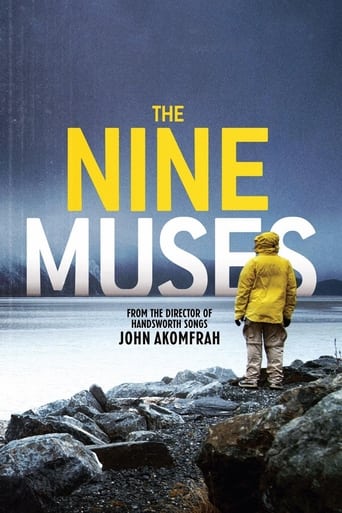Lovesusti
The Worst Film Ever
BlazeLime
Strong and Moving!
Derry Herrera
Not sure how, but this is easily one of the best movies all summer. Multiple levels of funny, never takes itself seriously, super colorful, and creative.
Roxie
The thing I enjoyed most about the film is the fact that it doesn't shy away from being a super-sized-cliche;
Martin Bradley
John Akomfrah's extraordinary film "The Nine Muses" isn't so much a documentary as a visual essay on the theme of immigration from the West Indies to the UK in the 1960's as it alternates between a forbidding Alaska, (for purely visual reasons, I'm sure) and a winterly Britain, both past and present. It looks amazing although the highfalutin narration, taken from everything from the Greek Myths to Shakespeare to James Joyce, and which gives the film its title, may put some people off.While not in anyway similar it reminded me very much of the films of Andrew Kotting and of "Sleep Furiously". There's something a little precious about the cross-cutting between the images of a totally inhospitable Alaska and an unwelcoming and grimly bleak UK as the black immigrants pile off the ships for a life lived out in steel mills and sweat shops. It isn't necessarily a film to draw you in; you are kept at a discreet distance. This is an art-house exploration of the immigrant experience that most people will fail to identify with; a video installation, more at home in a gallery than in a cinema. That said, once you find yourself set down in front of it, it is impossible to take your eyes off the screen. Documentary films may be many things but few are as much a work of art as this one is.
runamokprods
John Akomfrah has spent his career creating films that are more 'tone poems' about a subject than literal narrative or documentary. Combining newsreel footage with often surreal new images he shoots, and sometimes an audio collage approach to sound, Akomfrah's films are by turns brilliant,frustrating, effective, sophomoric and just plain unique. Some of the films 'work' better than others for me, but I suspect that is a subjective reaction, and one that could easily change on repeated viewings.In short, these are more like films you'd see playing as an installation in an art museum than at your local cinema, which probably explains why so little of Akomfrah's impressive body of work is available on home video.The Nine Muses takes as it's 'subject' Africans and others emigrating to England after WW II, and the difficulties in assimilating, as shown in numerous and well chosen old film clips. The film combines those clips with gorgeous, slightly surreal newly shot images of two unidentifiable men in parkas against the background of Alaska while on the soundtrack great writers from Homer to Beckett are read aloud by great actors (from Naxos' recorded book series, most many years old). The reading with the most clear thematic connection is "The Odyssey" and it's tale of a difficult journey. But all the readings echo the immigrant experience, if sometimes in a very oblique way. At the same time, the score is a mix of all sorts of music, sometimes crashing into and playing on top of each other (another comment on assimilation? Loss of identity?)I'll admit, by the end of the 93 minutes, I was starting to burn out a little on the lack of clear, neat connection and context between these images, words, and the eclectic score. But like poetry, this is a film that transcends logic to create a mood more than a story or point. And like poetry it may take more than one go round to 'get it'. And while I don't think it all works, I salute Akomfrah for being willing to challenge his audience with something experimental and different.
phobophob
John Akofrah tries to combine documentary and personal essay, which sounds promising. He merges archive imagery with beautifully shot - though heavy post produced - wintry landscapes of Alaska to tell the story of immigrants coming into the UK from the 60s onwards. Sadly, what starts out as a promising experiment ends up being a self indulgent, problematic and almost arbitrary combination of found footage, literature and music, each of them of high quality but all of them together boring and hard to bare. Like a cook who thinks combining expensive ingredients automatically will result in a exquisite dish John Akomfrah is wrong. It makes a mess and in the end you are just sad about the useless waste of the high class ingredients.

